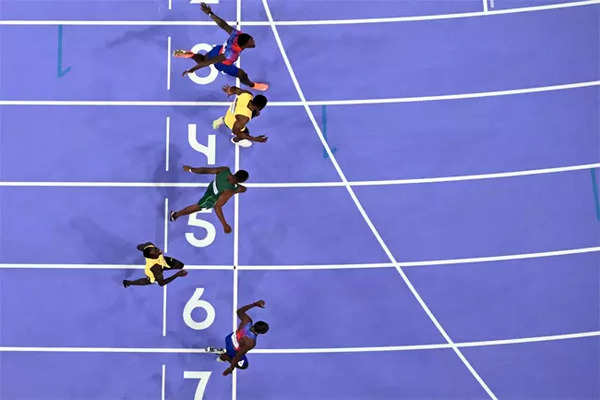Paris Olympics
witnessed the closest ever
men’s 100m final
in modern history and two statistics highlight that the most. One, the difference between the gold and silver medal was five thousandth of a second. And two, it marked the first ever men’s 100m race where each of the eight runners clocked under 10 seconds with a legal wind factor.
USA’s
Noah Lyles
won gold and Jamaican
Kishane Thompson
silver.
Both clocked 9.79 seconds, but the American’s .784 pipped Thompson’s .789 in the final spilt second of the race. The bronze went to the USA’s Fred Kerley (9.81 sec).
(AFP Photo)
HOW THE RACE BEGAN
Astonishingly, the eventual gold medallist in lane seven, Lyles, was the slowest off the blocks at 0.178 seconds.
At the 40 metre mark, Lyle was eighth but had found his stride pattern. Every runner was in with a chance as the barest of margins separated all of them.
HOW THE RACE ENDED
It appeared Lyles had left too much for too late as Thompson looked to be ahead when the time clock was stopped. A photo finish was brought into play to add to the drama. The runners waited, at least for 30 seconds, as Thompson yelled: “Come on!”
The judges checked. Eventually it was determined that Lyles had timed his dip to perfection and his chest was ahead of Thompson’s by what possibly measures to the width of the vest.
The giant screen soon flashed the standings and the timings. Lyles gold, Thompson silver, Kerly bronze. Both Lyles and Thompson clocked 9.79 but it was the five thousandth of a second that listed the American as number one and the Jamaican number two.
The 100m world champion added the Olympic gold to his CV in the most dramatic fashion. It’s also the first gold for USA in men’s 100m since the 2004 Games.
It was apparent that had the race been 99 metres, the gold medal would have gone to
Jamaica
. Wishful thinking, but it describes the most fiercely-contested 100m race ever.
WHY WAS THOMPSON SECOND DESPITE HIS FOOT CROSSING THE FINISH LINE FIRST
The clock stops ticking for every runner when his or her chest crosses the finish line, and not when the foot or any other body part is past the finish line. That’s where Noah perfectly-timed his lean with the chest in the final second and last metre of the race and won gold.
The American will also be seen sprinting in his favourite 200m besides the 4x100m relay.
